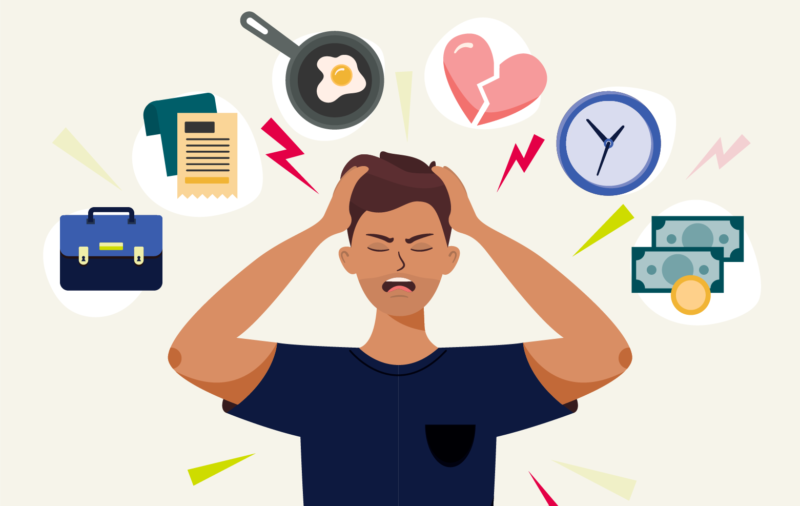- What is stress?
- What are the symptoms of anxiety?
- Is anxiety and stress linked to epilepsy?
- Can a panic attack cause a seizure?
- How are anxiety and stress treated?
- How to decrease your risk of having a seizure due to stress
Stress and anxiety are two sides of the same coin. While stress is a natural human feeling that serves to warn us of impending hazards and to protect us from threats, anxiety is your body’s response to stress. Stress is a feeling that most people experience for a short period. However, for some people, stress can develop into a chronic ailment that harms their quality of life.
This is true for people who experience seizures or have been diagnosed with epilepsy. This is your guide to everything you need to know about stress and seizures.
What is stress?
Stress is how your body reacts to a mental, emotional, or physical challenge. When under stress, your body releases the hormones cortisol and adrenaline. Together these two hormones increase your heart rate, blood pressure, and energy. They also increase the glucose level in the blood and suppress the digestive and reproductive systems in preparation to deal with the perceived threat.
Once the stressful situation has passed, hormone levels and systems return to normal.
What are the symptoms of anxiety?
Anxiety is a common occurrence in people’s lives. People with anxiety disorders, on the other hand, usually experience severe, excessive, and persistent concern and terror in ordinary settings. Anxiety disorders are frequently characterised by recurring episodes of acute anxiety, fear, or terror that peak within minutes (panic attacks).
The following are some of the most common symptoms of anxiety:
- Feeling jittery, agitated, or tense
- Increased heart rate
- Rapid breathing
- Sweating
- Trembling
- Insomnia
- Experiencing gastrointestinal issues
- Worried
- Lack of concentration

Is anxiety and stress linked to epilepsy?
At this stage, it is important to note that seizure causes and seizure triggers are different.
Triggers are situations that can bring on a seizure. For example, sleep deprivation can be a trigger while the underlying cause may be a head injury.
The leading causes of a seizure generally involve some sort of injury to the brain. Epilepsy is a term for the tendency to have more than one unexplained seizure. A person is usually only diagnosed with epilepsy after they have had more than one seizure.
Stress and anxiety can cause the physical symptoms of a seizure that are not caused by abnormal changes in the electrical activity of the brain. These seizures are known as Non-Epileptic Seizures (NES).
Stress is also a trigger for people who have been diagnosed with epilepsy. Many people report experiencing events more frequently when under high levels of stress. A recent study cited stress as the number one trigger in patients with epilepsy.
Many mental illnesses, including anxiety and depression, are co-morbid conditions to epilepsy. This means that many people who have epilepsy also suffer from anxiety and/or depression.
[Blog] How to recognise seizure-like events that are not a seizure
Can a panic attack cause a seizure?
Increased levels of anxiety can lead to a panic attack, which is a sudden, acute event. Many of the symptoms of a panic attack are similar to those that you might experience when you’re anxious.
However, you may suffer experience other serious signs, such as:
- Severe chest aches or trouble breathing or swallowing,
- Hot flashes or chills,
- Numbness or tingling in the extremities, and
- Panic or thoughts of being disconnected from yourself or reality.
Many of these symptoms can be confused with symptoms of a seizure, and misdiagnosis of either of these conditions is common.
Panic attacks can trigger an epileptic seizure or a non-epileptic seizure. An electroencephalogram (EEG) is a test that records brain activity which can help determine the nature of the event establishing whether they are epileptic, non-epileptic, or possibly caused by something else.

How are anxiety and stress treated?
Stress and anxiety symptoms can be reduced by making certain lifestyle adjustments. These strategies can be used along with medical treatment of anxiety under medical professional guidance.
Follow these techniques to reduce stress and anxiety:
- Consume a well-balanced and nutritious diet
- Keep caffeine and alcohol consumption to a minimum
- Obtain an adequate sleep routine
- Regular physical activity
- Meditation and relaxation techniques
- Set aside time for hobbies
If you’re having trouble coping with stress and worry, your primary care provider may refer you to a mental health professional. To help you work through your stress and worry, they may employ psychotherapy, often known as talk therapy, or cognitive behaviour therapy. To assist you with managing stress, your therapist may teach you applied relaxation techniques.
How to decrease your risk of having a seizure due to stress
High levels of stress are normally due to situations that have some type of personal meaning.
Whether your stress is due to a major life event or daily life, these points of reflection may help you manage your stress:
- Take a hard look at what is stressing you out in life. Identify all of the stressors you can, no matter how big or small.
- How are you coping with the stress? If your coping mechanisms are not working, find new coping strategies.
- Make sure you are getting adequate sleep and adhering to a routine sleeping pattern. Avoid frequent daytime naps since they can disrupt nighttime rest. If possible, adjust your schedule so that you can adhere to a consistent sleeping pattern.
- Analyse your eating habits. While some people eat more during periods of high stress, others eat more infrequently. There are people who experience more events if they haven’t eaten for long periods of time.
For people who have epilepsy or non-epileptic events, understanding the relationship between stress and seizures is an important part of managing the frequency of events. Reducing stress and anxiety can significantly improve your well-being. If you believe you are experiencing seizures but have not been diagnosed, you should immediately seek medical attention. Use this guide for questions to ask your doctor at your first appointment.
Seer Medical specialises in home-based testing to diagnose seizures and seizure-like events. Get in touch with us today to see if our service is right for you.

